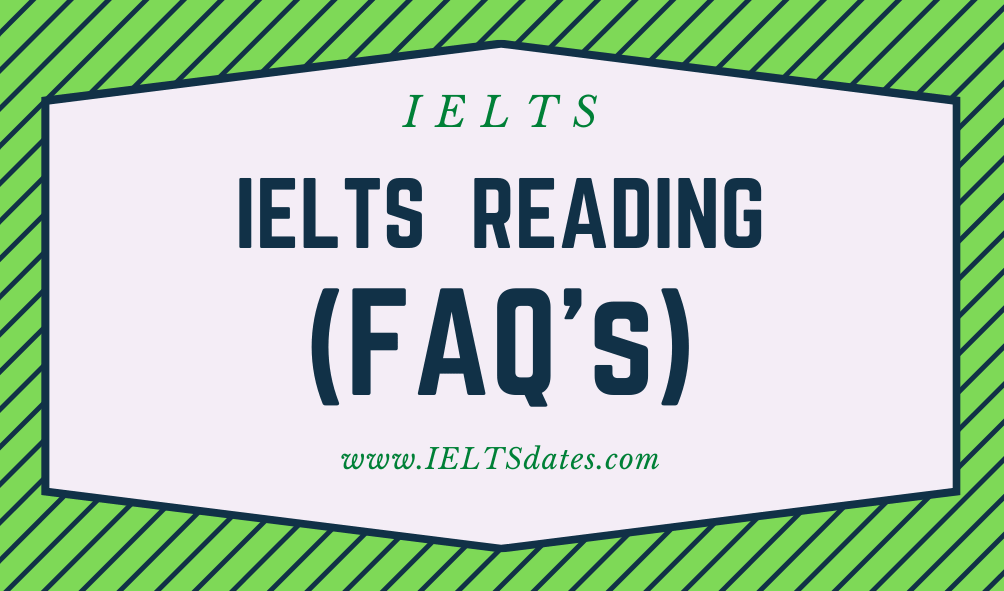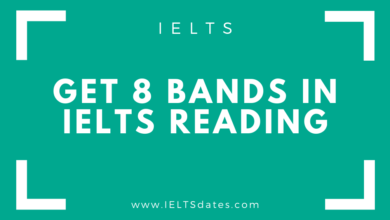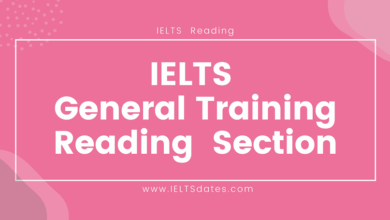Frequently Asked Questions on IELTS Test (Reading Section)
FAQs About IELTS Reading Section

Many candidates face problems in the reading section of an IELTS exam. For this purpose, we have taken into consideration some of the important frequently asked questions and have listed their answers below.
1. What is the Time Duration of the Reading Test of IELTS?
The test is of 60 minutes and you have to attempt it after the completion of your listening test. Moreover, in the reading section, you are not given the extra minutes to write the answers on the answer sheet.
2. What is the Total Number of Reading Passages I have to Read?
In the academic IELTS, there are 3 passages which you have to read while in the GT IELTS there are three sections. In each of the sections, you can have more than one text to read.
3. Does Everyone give the same kind of Reading Test?
No, there are two modules of the IELTS, the general training IELTS, and the academic IELTS. So, attempting a different kind of exam will also result in a different reading exam.
4. What type of Passages comes in Academic IELTS?
The passages are usually long as they are picked from books, newspapers, and magazines. Most of the time these passages contain complex English language, diagrams, maps, illustrations, and academic vocabulary.
5. What type of Passages comes in Academic IELTS for Reading?
In the general training module of IELTS, the reading section is comprised of three sections, each having its own difficulty. The first section contains the passages related to everyday life such as instruction manual, school course, etc. In the second section, there are passages related to the work such as training courses, resources, pay schemes, application procedures, etc. Lastly, in the third section, there is a long passage that is somewhat difficult and contains information on a general topic.
6. What is the Total Amount of Questions in the Reading Exam?
There are approximately 40 questions in total.
7. What is the Procedure for Calculating the Scores?
You are awarded one point against each of the correct answers. However, there is no negative marking as the writing wrong answer does not deduct your marks. Anyhow, the two modules of IELTS have a little different scoring pattern.
8. Is there any Deduction of Points on Answering the Question Wrong?
No, there are no marks deducted when you answer the question wrong. So, always try to answer every question because sometimes your luck might work as well.
9. Will I have the Extra Time to Transfer my Answers?
No, you will not be given any extra time for transferring the answers. You have to write the answers on the answer sheet during the given time.
10. How should I divide my Time into Each Passage?
It is suggested that you must take 20 minutes to solve questions of every passage. So, practice a lot, so that you can manage time wisely and keep your eyes on the clock also while giving the test. Anyhow, make sure that you have enough time to solve questions of the 3rd passage.
11. What kind of Questions does Come to the IELTS Reading Exam?
In the reading exam, there are many kinds of questions that you have to solve by following a proper strategy. These question types include True False, Matching the information, etc.
12. Can I make Notes on the Question Paper?
You can always make notes on the question paper or can underline the words on any page of the paper. But keep in mind that you will be awarded points for the answers you have written on the answer sheet.
13. Is it Important to Use Capital Letters?
No, it depends upon your wish whether you want to use them or not.
14. Can All the Answers be Written in Capital Letters?
Absolutely you can write the answers in capital letters. It is also a good practice because it makes it easy for the examiner to read.
15. Should I Solve the Paper with a Pencil or Pen?
For the listening and reading exam, you have to use a pencil to write the answers. However, for the writing section, you can use either a pen or a pencil for writing.
16. Are the Spellings of the Words Important?
Of course, they are. If you write the wrong spelling then your marks will be deducted. So, always pay special attention to your spellings.
17. Can I give the True False Answers by just Writing a T and F?
Yes, it is possible to write just a letter instead of a full word.
18. How to Enhance my Skills in Reading?
The following are some of the tips to increase your reading abilities.
- Develop an ability to solve each kind of question. Try to focus on one question and then practice it.
- Build your reading speed. Reading speed can give you a lot of advantages when it comes to scoring good in the exam. This is because the passages are very long and people with good speed of reading can solve them in time.
- Make a habit of scanning the text. The test of IELTS is not about understanding it but also about finding the answers in long passages.
- Read different academic articles. Read articles of BBC news, the economist, new scientist, etc.
- Practice a lot of practice tests to increase your ability to score well in the exam.
- Do a lot of practice to build your techniques.
- For the practicing purpose, you can consider the IELTS book of Cambridge in which there are example tests given.
19. Is it True that All Answers can be found in Order?
No, it is not necessary. For some questions, you can find the answers in order while for others you may not find. However, you have to learn which questions are written in such away.
20. How to have a good Score in the Question of Matching Headings?
There are different issues in the question of matching headings. You have to pinpoint the main idea of the paragraph. This main point can be the first sentence or can be in the middle of the paragraph. This tests your reading abilities that how well you can differentiate between the supporting points and the main point. Moreover, take your time to ponder over the headings. Make an understanding that what they mean and paraphrase them to find something similar in the paragraph.
Additionally, don’t consider the headings in the same order. We suggest that you remove that heading from the list which is distinctly related. This will make your finding of the right answer very easy. Do not waste a lot of time on the heading for which you can’t find the answer. Leave it and move forward. Lastly, make sure that you don’t match the key words just match their meanings. For example, if there is a heading that tells about some description of things then look for that paragraph that contains a lot of adjectives and descriptive words. Anyhow, try to predict the answers if you can’t find the one accurately as there is no negative marking.

